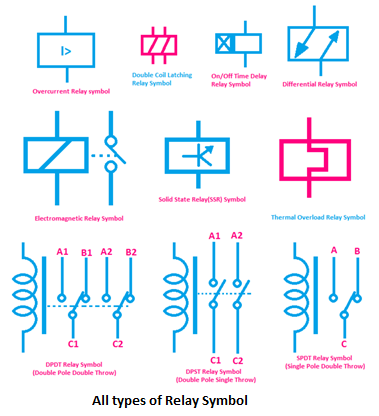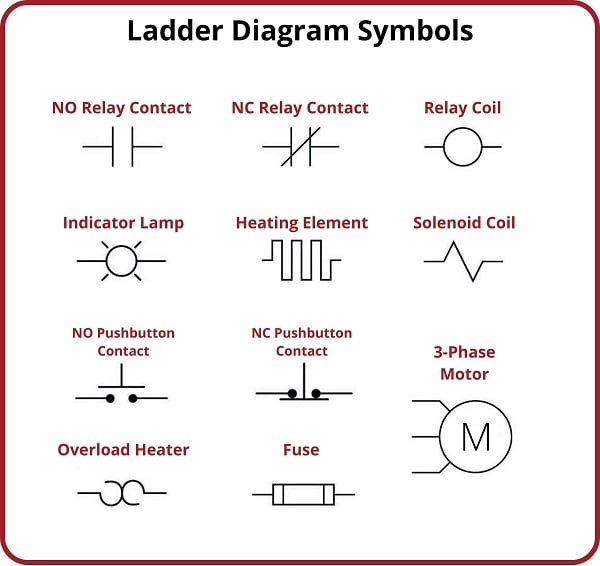Decoding the Normally Closed Relay Symbol: A Circuit Control Essential
Ever wondered about those cryptic symbols on electrical diagrams? They're not hieroglyphics, but a language all their own, crucial for understanding how circuits operate. One of these essential symbols represents the normally closed (NC) relay contact, a tiny component with a big role in controlling electrical flow. This article delves into the world of the NC relay symbol, unraveling its mysteries and revealing its importance in various electrical systems.
The normally closed relay contact symbol is more than just a squiggle on a schematic. It represents a critical piece of an electrical control puzzle, dictating how power flows when a relay is at rest. Imagine a small switch that's flipped "on" by default, only to be flipped "off" when an external force acts upon it. That's essentially what an NC relay contact does.
Understanding this symbol is paramount for anyone working with electrical circuits, from seasoned electricians to budding hobbyists. It's the key to deciphering circuit diagrams and understanding how relays control various devices. Whether you're troubleshooting a malfunctioning system or designing a new one, knowing how to read and interpret the NC relay symbol is an indispensable skill.
Relay contacts, both normally closed and normally open, have been around for over a century, evolving alongside the development of electrical technology. Initially used in telegraph systems, relays quickly found applications in various industries, from telecommunications to automation. The NC contact, specifically, plays a crucial role in safety systems, allowing circuits to default to a safe state in case of power loss or malfunction.
The normally closed contact symbol visually represents the contact's default state. Different standards may use slightly varied representations, but the core concept remains consistent: a path that is closed until the relay coil is energized. When the relay coil receives power, the NC contact opens, breaking the circuit. This seemingly simple action forms the foundation of countless control systems.
A normally closed relay contact ensures that a circuit is complete until the relay is activated. This is crucial in applications like alarm systems, where the alarm circuit needs to be closed unless triggered by a sensor.
A simple example is a security system. When the system is unarmed (relay not energized), the NC contact connects the alarm to the power supply, keeping the system active. When the system is armed (relay energized), the NC contact opens, disconnecting the alarm and allowing it to be triggered by sensors.
Benefits of using normally closed contacts include fail-safe operation, simplified circuit design in specific applications, and efficient control of power flow.
If your system needs a default “on” state, a normally closed relay is essential. Double check your wiring diagram to correctly identify the normally closed relay connections.
Advantages and Disadvantages of Normally Closed Relays
| Advantages | Disadvantages |
|---|---|
| Fail-safe operation in certain applications | Can consume more power in some configurations |
| Simplified circuit design for specific functionalities | Not suitable for all applications where a default "off" state is required |
Best Practice 1: Choose the right relay for the application.
Best Practice 2: Understand the wiring diagram thoroughly.
Best Practice 3: Use appropriate wiring techniques.
Best Practice 4: Test the circuit thoroughly after implementation.
Best Practice 5: Consider environmental factors.
Real-world Examples: Alarm systems, safety shutdowns, industrial control systems, automotive applications, and lighting control systems.
Challenges and Solutions related to NC relay symbols might include misinterpreting the symbol, choosing the wrong type of relay, or incorrect wiring. Solutions involve careful examination of diagrams, consulting datasheets, and testing the circuit.
FAQs: What does NC stand for? What is the difference between NC and NO? How does an NC relay work? What are the applications of NC relays? How do I test an NC relay? What are common problems with NC relays? How to troubleshoot NC relay circuits? What are the safety considerations when working with NC relays?
Tips and Tricks: Always double-check the wiring. Use a multimeter to test the relay. Consult datasheets for specific relay information.
In conclusion, the normally closed relay symbol, a seemingly small element in circuit diagrams, plays a pivotal role in controlling electrical systems. Understanding its function, applications, and associated best practices is essential for anyone working with electrical circuits. From ensuring safety in critical systems to enabling complex automation processes, the NC relay's importance cannot be overstated. By mastering this fundamental component, you gain a deeper understanding of circuit logic and open up a world of possibilities in electrical design and troubleshooting. Its ability to provide a default state in circuits simplifies design and enhances safety features. As technology advances, the continued relevance of the normally closed relay and its symbol remains assured, making it a timeless element in the ever-evolving world of electrical engineering. Take the time to study and understand this crucial symbol; it’s a small investment that will pay off significantly in your electrical endeavors.
Best captions for instagram pics your ultimate guide to insta worthy words
Mastering the curveball a pitchers guide
Inking your duality exploring the appeal of good and evil tattoos in old orchard beach













